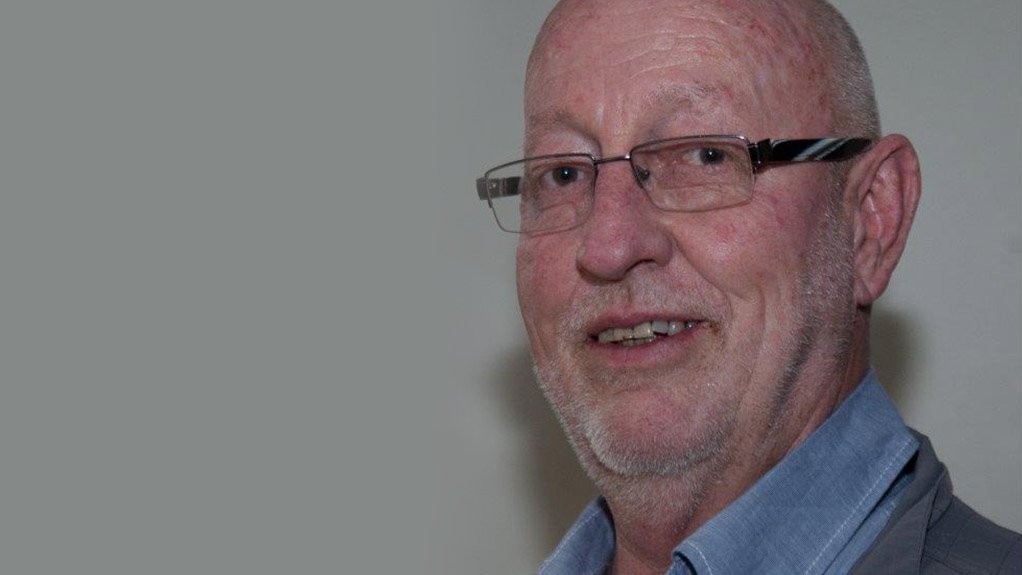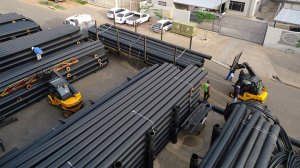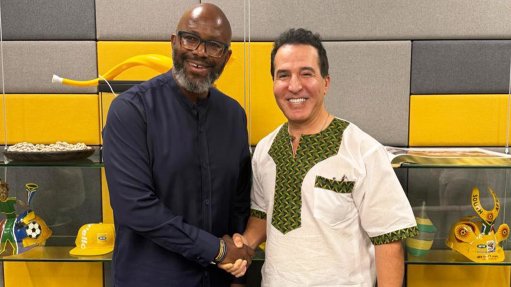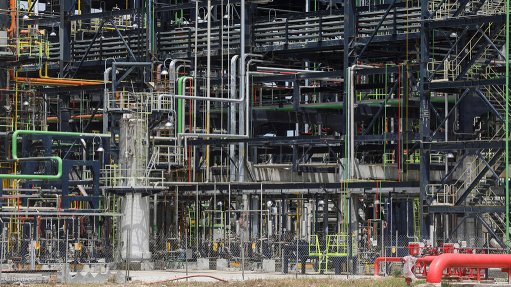African market helping local pipe manufacturer recover


Pipeflo business manager Lizl du Preez discusses the effects of the Marikana tragedy on the pipes industry.
STEFANUS OOSTHUIZEN The company is expanding into the African market
South African plastic pipes manufacturer Pipeflo has been expanding its presence in the African market to recover from the financial downturn that resulted from the high incidence of labour unrest in the mining industry in 2012, which has been recurring since, company founder and director Stefanus Oosthuizen tells Engineering News.
“These strikes have not only had a negative impact on the mining industry and the country’s economy but have also directly impacted on the pipes industry.
“This is as a result of companies having become cautious of hastily investing in mining projects, so we receive orders for projects at a slower pace. New mining projects need pipes but, unlike before, there is currently a delay in starting the projects,” he elaborates.
Oosthuizen says these effects started to show in 2012, when labour unrest in South Africa’s platinum belt culminated in the loss of 44 lives.
“For instance, last year, on the day before the Marikana tragedy, we were due to start a big production run on a specific pipe size at a local mine, but the company that had placed the order called us in the morning and asked us not to continue, as it had assessed the situation at Marikana and decided to halt some projects,” he adds.
Oosthuizen says that, prior to the labour unrest, Pipeflo – which supplies pipes to the mining, telecommunications, water, farming and gas sectors – regarded the mining industry as its biggest source of revenue.
He explains that, while the company has ongoing projects in South Africa and is open to expanding its client base in the country, Pipeflo is using this opportunity to focus more on mining and other projects in other African countries.
“There is a significant market in Africa. After the strikes, companies more read-ily wanted to invest in mining projects in, for example, the Democratic Republic of Congo (DRC), Tanzania and Zambia,” says Oosthuizen.
The DRC and Zambia have significant copperfields – with the world’s richest copperbelt spanning the two countries – and Tanzania is rich in gold, coal and tanzanite.
Further, there are also opportunities beyond the mining sector in some developing countries in Africa, adds Oosthuizen.
“There are some big water projects in Africa, where many governments and private-sector companies are constructing water plants and [doing] pipe installations to help with water distribution.
“We are currently helping a South African business that is working with an Angolan company to set up a water distribution network and fabrication plant in Angola,” he explains.
With developments in the telecommunications sector and the need for Africa to bridge the gap between it and the rest of the world in terms of new technology, Oosthuizen foresees a rise in demand from this sector.
“We are also considering targeting major telecommunication projects in the near future, as I believe telecommunications is booming in Africa.”
However, a continent as rich in mine-ral resources as Africa definitely presents unprecedented pipe usage opportunities, says Oosthuizen.
“We participated – through a partnership with a local company with international credentials – in a project in Ethiopia, where they will be pumping hot water from the desert to feed drilling rigs and for other applications. We have had to manufacture special pipes for that project for export to Ethiopia.
“We’re hoping that the project’s success will get us more orders from the markets in Ethiopia and East Africa,” he adds.
Oosthuizen states that Pipeflo is committed to providing high-quality products to ensure that piping projects on the continent are awarded to African companies to further develop Africa’s economy.
“We don’t want to see piping projects in Africa being awarded to Asian or European companies just because the quality of our products is poor, so we don’t compromise on quality. We always ensure that we produce the highest-quality pipes,” he highlights.
Oosthuizen predicts that demand from the fuel sector will also present opportunities for pipe manufacturers on the continent.
“I foresee that gas and petroleum will be big in many African States, such as Namibia. We are already exporting pipes for other sectors to that country and I expect that we will be getting more orders from the gas sector in Namibia,” he says.
However, Oosthuizen maintains that the weakening rand makes exporting pipes and importing raw material challenging.
“South African raw material manufact- urer do not produce sufficient material to meet the plastic pipes industry’s demand so we have to rely on imported material.
“With the rand fluctuating in this fashion, it’s difficult to buy our material at the right time and at the right price while still managing to make a profit,” notes Oosthuizen.
Recipe for Success
Oosthuizen attributes Pipeflo’s success during its 13-year existence to the company’s willingness to invest in human resources development, as it offers several in-house training programmes to personnel and promotes personnel from its own ranks.
“We strive to create an environment where everybody enjoys coming to work and to ensure that they are able to make a decent living with their earnings,” he reiterates.
Emphasising the company’s focus on keeping its 50 employees happy, Oosthuizen adds: “Our approach is that, if your business isn’t good enough to pay a decent salary, then maybe you shouldn’t be in business.”
He notes that it is important for any company in the twenty-first century to adapt to the times to be able to grow.
“Historically, our success was attributed to the company constantly changing. Initially, we manufactured only small pipes, but owing to the change in market demands, we currently supply a variety of pipes for different sectors,” he explains.
Further, Oosthuizen maintains that it is important for any business to understand the industry in which it operates.
“We constantly fragment the market according to sector and geography, and consider each sector’s and region’s speci- fic needs – hence, our focus on growing our footprint in the African market,” he explains.
In addition, Oosthuizen has called on local pipe manufacturers to ensure that they are registered with the local quality regulators to ensure that the country’s products are on par with international standards.
“Companies importing plastic pipes from South Africa must insist that the supplier of such pipes is accredited with the South African Bureau of Standards and is a member of the South African Plastic Pipe Manufacturers Association, or Sappma, to ensure a quality product is supplied,” he explains.
The Durability of Plastic
Oosthuizen believes that using plastic, as a material of choice for manufacturers, will increase, as plastic and polymer technology keeps advancing and can be used for many applications.
He adds that plastic can easily be recycled into other products while it is also cheaper than steel and provides businesses with various innovation opportunities, which is also beneficial.
“There is an enormous market for plastic products and some entry-level recycled plastic raw material is quite cheap, which makes it attractive for business opportunities other than just pipes,” he explains.
Oosthuizen says the plastics industry supports job creation as well as South Africa’s economy through informal traders who collect plastic waste and sell it to recycling companies.
“Many companies are dependent on this well-developed informal entrepreneurial sector,” he concludes.
Article Enquiry
Email Article
Save Article
Feedback
To advertise email advertising@creamermedia.co.za or click here
Press Office
Announcements
What's On
Subscribe to improve your user experience...
Option 1 (equivalent of R125 a month):
Receive a weekly copy of Creamer Media's Engineering News & Mining Weekly magazine
(print copy for those in South Africa and e-magazine for those outside of South Africa)
Receive daily email newsletters
Access to full search results
Access archive of magazine back copies
Access to Projects in Progress
Access to ONE Research Report of your choice in PDF format
Option 2 (equivalent of R375 a month):
All benefits from Option 1
PLUS
Access to Creamer Media's Research Channel Africa for ALL Research Reports, in PDF format, on various industrial and mining sectors
including Electricity; Water; Energy Transition; Hydrogen; Roads, Rail and Ports; Coal; Gold; Platinum; Battery Metals; etc.
Already a subscriber?
Forgotten your password?
Receive weekly copy of Creamer Media's Engineering News & Mining Weekly magazine (print copy for those in South Africa and e-magazine for those outside of South Africa)
➕
Recieve daily email newsletters
➕
Access to full search results
➕
Access archive of magazine back copies
➕
Access to Projects in Progress
➕
Access to ONE Research Report of your choice in PDF format
RESEARCH CHANNEL AFRICA
R4500 (equivalent of R375 a month)
SUBSCRIBEAll benefits from Option 1
➕
Access to Creamer Media's Research Channel Africa for ALL Research Reports on various industrial and mining sectors, in PDF format, including on:
Electricity
➕
Water
➕
Energy Transition
➕
Hydrogen
➕
Roads, Rail and Ports
➕
Coal
➕
Gold
➕
Platinum
➕
Battery Metals
➕
etc.
Receive all benefits from Option 1 or Option 2 delivered to numerous people at your company
➕
Multiple User names and Passwords for simultaneous log-ins
➕
Intranet integration access to all in your organisation




















